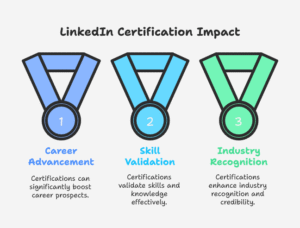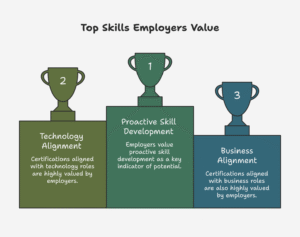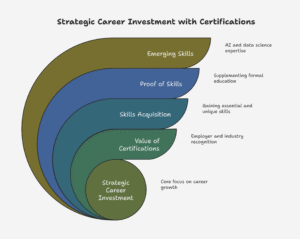Are they worth it?
The great LinkedIn certification debate has officially entered 2025 with more heat than ever.
You’ve probably seen them everywhere—those shiny digital badges adorning profiles like merit symbols from summer camp.
But here’s the million-dollar question that’s keeping career-minded professionals up at night:
are these certifications actually moving the needle, or are we all just collecting fancy participation trophies?
Let’s cut through the noise and get real about what these credentials can and can’t do for your career trajectory.
The LinkedIn Certification Reality Check
First things first—what exactly are we talking about here?
LinkedIn certifications are digital credentials earned through completing courses on LinkedIn Learning, covering everything from artificial intelligence to leadership skills.
Think of them as bite-sized learning modules that end with a certificate you can proudly display in your profile’s “Licenses & Certifications” section.
But here’s where it gets interesting.
These aren’t your grandmother’s dusty college diplomas.
They’re something different entirely—a new breed of professional credential that’s causing quite the stir in hiring circles.
The Numbers Don’t Lie (And They’re Pretty Compelling)
Here’s a stat that might make you sit up straighter: 91% of hiring managers consider certification an important hiring criterion.
That’s not a typo—nine out of ten people making hiring decisions are actually paying attention to these digital badges.
But wait, there’s more context to unpack here. Many employers recognize these certifications as evidence of proactive skill development, especially when courses align with roles in technology, business, and digital fields. The key phrase here is “proactive skill development”—it’s less about the certificate itself and more about what it signals to potential employers.
The Sweet Spot: Where LinkedIn Certifications Actually Shine
Let’s talk about the real benefits, because they’re more strategic than you might think. Courses are curated and taught by industry experts, addressing current market demands and trends like AI, tech, leadership, and design. This isn’t theoretical knowledge gathering dust in ivory towers—it’s practical, immediately applicable stuff.
The career advancement angle is particularly compelling. Certified skills can lead to promotions or new job opportunities, serving as concrete evidence of capability, especially for recent graduates or those changing careers. If you’re pivoting from marketing to data analysis or from finance to project management, these certifications can bridge credibility gaps that might otherwise leave you stuck.
Then there’s the networking effect. Displaying certifications on your profile provides a way to signal credibility and drive interest from recruiters, clients, or collaborators. It’s like having a conversation starter that actually means something professionally.
The Plot Twist: Industry Context Matters More Than You Think
Here’s where the story gets nuanced. LinkedIn certifications are not accepted as substitutes for degrees or professional credentials in regulated or highly academic fields such as medicine, law, or engineering. If you’re trying to become a surgeon or represent clients in court, these certificates won’t cut it.
The perception game varies wildly too. Some employers may perceive online certifications as less rigorous compared to university-level coursework or industry-standard exams, depending on the field and role. It’s frustrating but true—bias exists, and it’s not going anywhere overnight.
Tech, design, and business are more receptive, while traditional sectors may place less weight on these credentials. This means your mileage will vary dramatically based on where you’re aiming your career.
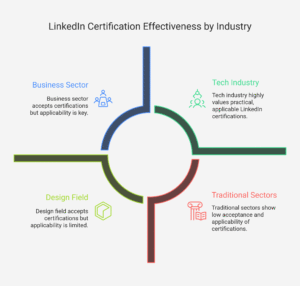
The Strategic Questions You Need to Ask
Before you dive headfirst into certification collection mode, pause and consider these critical questions.
- Are your target employers and industry leaders valuing certifications from online learning?
- Will these courses teach you skills you actually need and cannot gain otherwise?
- Do you lack other formal proof of skills such as degrees or prior experience?
This isn’t about following trends—it’s about strategic career investment.
If your answer is yes to one or more of these questions, LinkedIn certifications may be well worth your investment in time and money, especially for career changers, new graduates, or professionals seeking to update or diversify their skill set.
The 2025 Certification Sweet Spots
Not all certifications are created equal, and timing matters.
Top areas identified for 2025 include AI, data science, project management, leadership, negotiation, customer service, and communication.
Notice the pattern?
These are skills that either didn’t exist five years ago or have evolved dramatically.
The artificial intelligence and data science certifications are particularly hot right now.
With AI transforming virtually every industry, having credentials that demonstrate your ability to work with these technologies isn’t just nice-to-have—it’s becoming essential for staying relevant.
Find out more about the best IT certifications for beginners to get hired in 2025.
The Mechanics: How to Actually Make This Work
The process itself is straightforward.
Take a complete course through LinkedIn Learning, pass the assessment, receive a digital certification, and add this certification to your LinkedIn profile under “Licenses & Certifications” to maximize visibility for potential employers or business contacts.
But here’s the insider move: don’t just collect certificates like Pokemon cards.
Choose strategically based on your career goals and industry trajectory.
Quality over quantity wins every time.
The Personal Branding Angle
There’s another layer to this story that often gets overlooked.
A LinkedIn profile enriched with certifications helps reinforce your professional credibility and signals dedication to self-improvement. In 2025’s competitive job market, signaling continuous learning isn’t just smart—it’s survival.
The platform encourages ongoing skill development, a necessity in the modern, rapidly-evolving workforce. This matters more than ever as technology continues reshaping how we work.
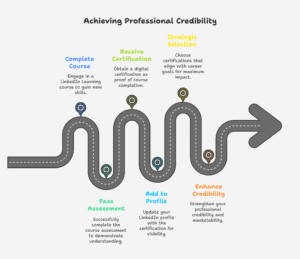
The Bottom Line: A Strategic Tool, Not a Magic Bullet
Here’s the truth that cuts through all the hype and skepticism: LinkedIn certifications are generally worthwhile for career development, provided they match your industry needs and career objectives.
They’re best viewed as a tool to complement, not replace, traditional credentials or real-world experience.
The sweet spot is using these certifications strategically—not as shortcuts to expertise, but as evidence of your commitment to staying current and skilled in an evolving professional landscape.
They work best when they fill specific gaps in your resume or demonstrate expertise in emerging areas where traditional education hasn’t caught up yet.
For career changers, recent graduates, or professionals in rapidly evolving fields like technology and digital marketing, LinkedIn certifications can provide that crucial credibility bridge. For established professionals in traditional industries, they might be less impactful but could still demonstrate forward-thinking and adaptability.
Learn more about how to study for IT certification exams.
The key is approaching them with clear intention rather than collection fever.
Choose certifications that align with your career trajectory, take the learning seriously, and use them as conversation starters rather than conversation enders. In 2025’s job market, they’re not game-changers on their own—but as part of a broader professional development strategy, they can definitely be game-enhancers.
Key Takeaways
- Strategic Value: LinkedIn certifications are valuable for showcasing proactive skill development, especially in fast-paced fields like technology, business, and digital marketing.
- Not a Substitute: They are not a replacement for formal degrees or required licenses in regulated professions such as law, medicine, or engineering.
- Industry-Dependent: The impact of a certification heavily depends on the industry and specific job role. They are most valued in tech and business sectors.
- Purposeful Selection: It is crucial to choose certifications that fill specific skill gaps, align with your career ambitions, and address emerging industry trends like AI.
- Enhances Personal Brand: Displaying certifications on your profile boosts professional credibility and signals a strong commitment to continuous learning in a competitive job market.
Frequently Asked Questions
Do employers really care about LinkedIn certifications?
Yes, many do. Data shows a high percentage of hiring managers view them as an important hiring criterion as they signal proactive skill development and a commitment to self-improvement. However, their actual weight varies significantly by industry and the specific role’s requirements.
Can a LinkedIn certification replace a college degree?
No. LinkedIn certifications should be seen as supplementary credentials. They complement formal education and real-world experience but do not replace them, especially in highly regulated or academic fields that require formal degrees or licensure.
Which LinkedIn certifications are most valuable in 2025?
Certifications in high-demand, rapidly evolving fields like Artificial Intelligence, Data Science, Project Management, Leadership, and Communication are considered particularly valuable. They demonstrate up-to-date knowledge in areas critical to the modern workforce.
How do I choose the right certification for me?
You should choose strategically. Analyze your long-term career goals, identify any skill gaps on your resume, and research which skills are currently in high demand in your target industry. A certification should directly address one or more of these points to provide the most value.

